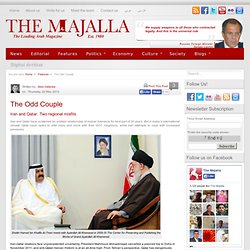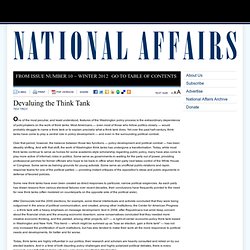

The Odd Couple. Iran and Qatar: Two regional misfits Iran and Qatar have sustained an unlikely relationship of mutual tolerance for best part of 30 years.

But in today’s international climate Qatar have opted to side more and more with their GCC neighbors, while Iran attempts to cope with increased pressures. Sheikh Hamad bin Khalifa Al-Thani meets with Ayatollah Ali Khamanei in 2009 (© The Center for Preserving and Publishing the Works of Grand Ayatollah Ali Khamenei) Iran-Qatar relations face unprecedented uncertainty. President Mahmoud Ahmadinejad cancelled a planned trip to Doha in November 2011, and anti-Qatari Iranian rhetoric is at an all-time high. Once decent friends Iranian commentators routinely describe Qatar as Iran’s second best friend among the Arab States of the Gulf. For the regime in Tehran, the GCC military intervention in Bahrain was a bitter moment. The same kind of experimental, if not wavering, stance has been evident in Qatar’s position toward Iran on a regional level.
FOREIGN POLICY. False Flag - By Mark Perry. Buried deep in the archives of America's intelligence services are a series of memos, written during the last years of President George W.

Bush's administration, that describe how Israeli Mossad officers recruited operatives belonging to the terrorist group Jundallah by passing themselves off as American agents. According to two U.S. intelligence officials, the Israelis, flush with American dollars and toting U.S. passports, posed as CIA officers in recruiting Jundallah operatives -- what is commonly referred to as a "false flag" operation. The memos, as described by the sources, one of whom has read them and another who is intimately familiar with the case, investigated and debunked reports from 2007 and 2008 accusing the CIA, at the direction of the White House, of covertly supporting Jundallah -- a Pakistan-based Sunni extremist organization.
The officials did not know whether the Israeli program to recruit and use Jundallah is ongoing. David Silverman/Getty Images.
The Philosopher's Beard. Surveillance Inc: How Western Tech Firms Are Helping Arab Dictators - Trevor Timm & Jillian C. York - International. As democratic movements spread in the Middle East, governments are cracking down, and that means big business for the companies who help them do it.

A computer systems coordinator at Tunisia Television in Tunis / Reuters Reliance means vulnerability, and the activists and citizen journalists of the Arab uprisings rely heavily on the Internet and mobile technology. They use text messaging to coordinate protests, for example, or social media sites to upload the photos and videos that then make it into mainstream global media. In the first protests in Tunisia, because traditional journalists could not get access, citizen journalists filled in, using YouTube and the live-streaming platform UStream to give the world -- including, for example, the Egyptians and Syrians who later began revolts of their own -- a window into the events there.
For all of the good this technology has done, activists are also beginning to understand the harm it can do. Devaluing the Think Tank. One of the most peculiar, and least understood, features of the Washington policy process is the extraordinary dependence of policymakers on the work of think tanks.

Most Americans — even most of those who follow politics closely — would probably struggle to name a think tank or to explain precisely what a think tank does. Yet over the past half-century, think tanks have come to play a central role in policy development — and even in the surrounding political combat. Over that period, however, the balance between those two functions — policy development and political combat — has been steadily shifting. And with that shift, the work of Washington think tanks has undergone a transformation. Today, while most think tanks continue to serve as homes for some academic-style scholarship regarding public policy, many have also come to play more active (if informal) roles in politics.
Some new think tanks have even been created as direct responses to particular, narrow political exigencies. The FP Top 100 Global Thinkers. All revolutionaries want their stories told to the world, and no one has conveyed the hopes and dreams of Egyptians more vividly than Alaa Al Aswany.

The dentist turned author rose to fame with his 2002 novel, The Yacoubian Building, which charted Egypt's cultural upheaval and gradual dilapidation since throwing off its colonial shackles. Aswany used his prominence to help found the Kefaya political movement, which first articulated the demands that would energize the youth in Tahrir Square: an end to corruption, a rejection of hereditary rule, and the establishment of a true democratic culture.
For his political activism, Aswany was blacklisted by Egypt's state-owned publishing houses, and security officials harassed the owner of the cafe where he met with young writers. How times change. Aswany was a fixture in Tahrir Square during Egypt's uprising -- he was almost killed three times, he said, during the running battles between demonstrators and pro-Mubarak thugs. Foreign policy - Politique étrangère - Diplomacy - Diplomatie. U.S. - Saudi. Africa Defense Journal.